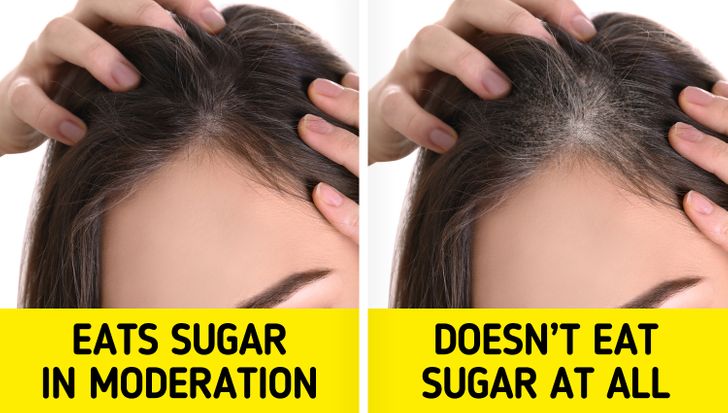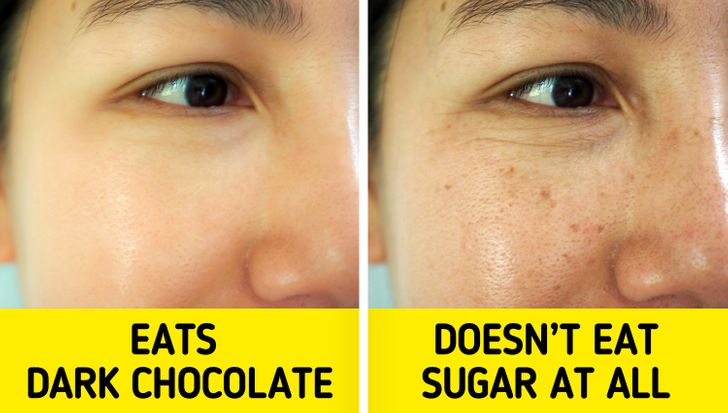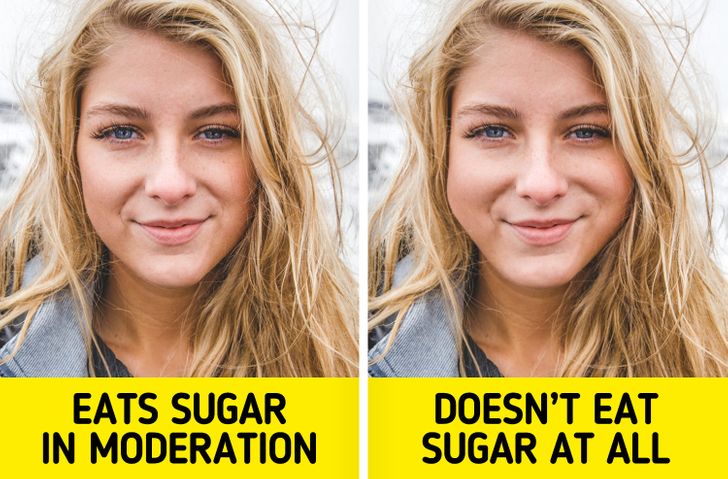Sugar is a staple in modern diets, lurking in everything from sodas to sauces. Many people consider a sugar detox to shed pounds, clear their skin, or boost energy. But what happens if you stop eating sugar altogether? The effects might surprise you. While some changes can enhance your wellness, others might throw your body off balance. We’ll dive into five key outcomes: slower hair growth, vulnerable skin, unexpected weight gain, intensified mood swings, and trouble concentrating. Backed by science and expert advice, this article will help you decide if going sugar-free is worth it—and how to do it right.
What Happens When You Stop Eating Sugar
Why Your Hair Might Grow More Slowly Without Sugar

Sugar isn’t just a treat; it’s an energy source that can influence hair health. Cutting it out completely might slow your hair growth cycle.
How Sugar Fuels Hair Growth
Hair follicles need glucose—a sugar byproduct—for energy to produce new strands. The American Academy of Dermatology explains that a balanced intake of carbohydrates supports this process. Without enough sugar, your body may redirect energy to vital organs, leaving hair growth on the back burner. Over time, this could mean thinner or slower-growing locks.
Hormonal Ripple Effects
Sugar also affects insulin levels, which play a role in hair health. A sudden drop in sugar intake might disrupt this balance, potentially leading to shedding or weaker strands. This is especially true if your diet lacks alternative energy sources.
Tips to Keep Your Hair Thriving
Going sugar-free doesn’t have to spell doom for your hair. Swap sugar for nutrient-rich carbs like whole grains, fruits, or sweet potatoes to keep energy flowing. With the right approach, your hair can stay luscious even without sugar.
How Your Skin Could Become More Vulnerable to Damage

Sugar often gets blamed for acne, but quitting it entirely might expose your skin to new risks. Here’s why moderation might beat elimination.
Sugar’s Hidden Skin Benefits
Excess sugar can harm skin by triggering glycation, which breaks down collagen. However, in moderation, glucose supports skin cell energy and hydration, bolstering its barrier against UV rays and pollution. A study in Nutrients (source) highlights glucose’s role in maintaining this protective shield.
The Downside of Going Sugar-Free
Without enough sugar, your skin might struggle to repair itself, leading to dryness, irritation, or faster aging. This vulnerability spikes if you don’t replace sugar with other hydrating foods, leaving your complexion exposed to environmental stressors.
Protecting Your Healthy Skin
To maintain a radiant glow, fuel your skin with alternatives like berries, avocados, or nuts—rich in antioxidants and healthy fats. Pair this with a solid skincare routine featuring moisturizers and SPF. Quitting sugar can still work for healthy skin if you prioritize balance and protection.
Could You Gain Extra Pounds by Ditching Sugar?

It’s a shocker: stopping sugar might lead to weight gain instead of loss. Let’s unpack this paradox.
The Craving Conundrum
When sugar vanishes, your body craves fast energy. This often drives people to overindulge in refined carbs (like white bread) or fatty snacks—both calorie bombs. Research in Appetite (source) shows that sugar restriction can heighten cravings for high-calorie substitutes, tipping the scale upward.
Metabolic Shifts
Sugar helps regulate metabolism. A drastic cut can slow your metabolic rate as your body adapts, burning fewer calories. This hiccup can stall weight loss goals or even reverse them, especially in the early stages of a sugar detox.
Avoiding the Weight Trap
Stay ahead by replacing sugar with filling, low-calorie options like vegetables, lean proteins, and fiber-rich grains. Weight loss supplements or appetite suppressants can curb cravings. A sugar-free life doesn’t have to mean extra pounds—just smarter choices.
Why Your Mood Swings Might Intensify Without Sugar

Sugar isn’t just a pick-me-up; it’s tied to your brain’s happiness chemicals. Quitting it can turn your emotions into a wild ride.
Sugar’s Mood Magic
Eating sugar boosts serotonin, the neurotransmitter that keeps you calm and content. Without it, you might feel irritable, anxious, or down. A study in Psychosomatic Medicine (source) links low-sugar diets to mood dips, especially during the adjustment phase.
Navigating Withdrawal
Sugar withdrawal mimics addiction symptoms—think fatigue, crankiness, and emotional lows. This rollercoaster can last days or weeks, testing your resolve to stick with a sugar detox.
Steadying Your Emotions
Ease into sugar reduction to soften the blow. Add mood-lifting foods like walnuts, salmon (rich in omega-3s), or a square of dark chocolate. Pair this with mental health tips like meditation or a brisk walk. Your mood can stabilize without sugar—it just takes patience.
Why Concentration Might Falter Without Sugar

Your brain thrives on sugar, and cutting it out can cloud your focus. Here’s how a sugar detox might mess with your mind.
Brain Fuel Basics
Glucose powers cognitive functions like memory and attention. A sharp drop in sugar can cause hypoglycemia—low blood sugar—leading to dizziness or brain fog. The American Diabetes Association notes that extreme carb cuts can impair mental clarity, particularly short-term.
The Adaptation Struggle
Over time, your brain can switch to ketones (from fat) for energy, but the transition isn’t instant. During this shift, you might feel sluggish or distracted, making work or study a chore.
Keeping Your Mind Sharp
Sustain mental clarity with complex carbs like oats, brown rice, or lentils, which release energy steadily. Snack on fruits for a natural sugar hit when focus fades. A sugar-free brain can still perform—you just need the right fuel.
Conclusion: Should You Quit Sugar for Good?
Quitting sugar altogether isn’t a one-size-fits-all fix. It can lower inflammation and stabilize blood sugar, but it might also slow hair growth, weaken skin, spark weight gain, worsen mood swings, and blur concentration. The trick? Don’t ditch sugar cold turkey. Gradually reduce it, replacing it with wholesome alternatives to dodge the downsides. This balanced approach lets you enjoy a sugar detox without sacrificing your wellness.
Want more? Explore our nutrition tips and healthy living guides for actionable advice. Your body—and mind—will thank you.
Preview photo credit unsplash.com









Leave a Reply